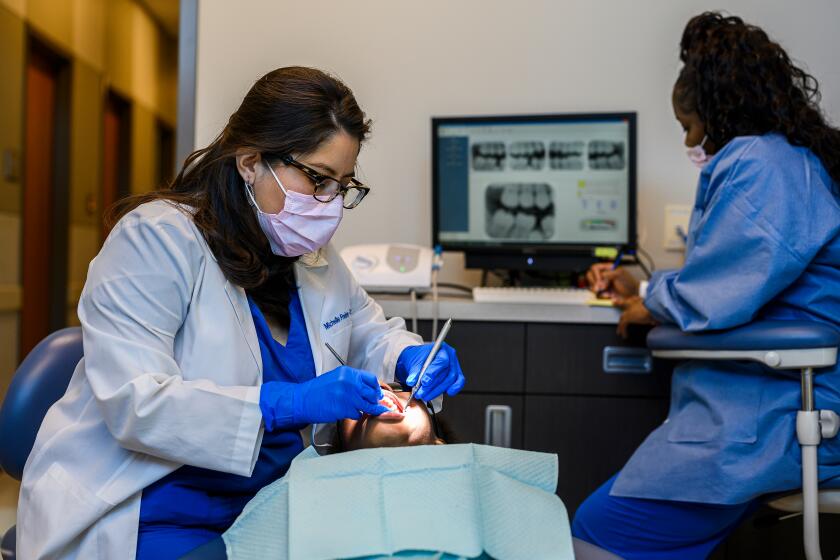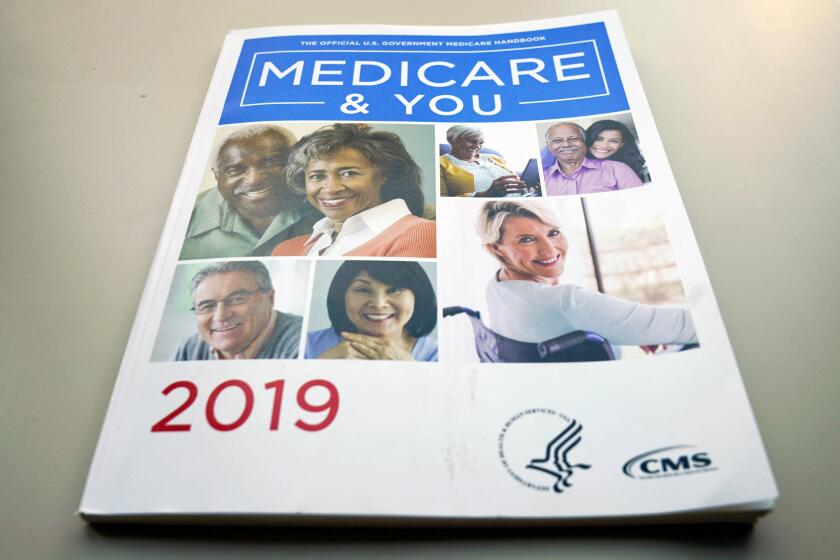What you should know about Medicare, Medigap and Advantage plans

- Share via
Dear Liz: I’ve read your most recent columns about Medicare Advantage and believe that more should be said before people decide to go that route.
You mentioned that switching from Medicare Advantage to Medicare itself can be problematic. As a couple who have had both plans and now have Medicare with a Medigap plan, I want to say that the best (and, by the way, easiest) switch my husband and I made was to go back to Medicare.
People should understand that Medicare Advantage plans become their primary insurance, severely limiting their ability to go to whatever doctor or hospital is most convenient. When traveling, they are limited to the hospital and doctor they chose with their Advantage plan, the one near home! My husband also could not go to a doctor I had because we were signed up at different local hospitals.
So I phoned Medicare in 2009 and a young man was so helpful, and in no time we were back on Medicare. He said to go to the Medicare website, choose from the many Medigap options offered that suited our needs, and we did. It was that easy.
We opted for no copays, skilled nursing care, and much more. Granted, our monthly premiums are more than they would have been before, but since that date we have not laid out one cent for medical care including doctor visits, my husband’s open heart surgery (at a hospital of our choosing), emergency room and surgery for my broken ankle, and annual EKGs to monitor his heart.
Surprisingly, we also have coverage for foreign medical treatments and took advantage of that in 2018 for minor surgery needed. The Medigap insurance covered 80% of that when our travel insurer refused to pay.
Our Medigap policy also allows us to go to any doctor or hospital without a referral. And, of course, Medicare is accepted throughout the U.S., and Medicare Advantage plans are not. The tens of thousands of dollars we have saved in the last 11 years make it worth paying more each month, and we have peace of mind.
Democrats are again trying to bring dental coverage to Medicare. Dentists, fearing lower payments, are against the idea.
Answer: Thanks for writing and for sharing your experience.
For readers who haven’t kept up with the discussion: Medicare Advantage plans are offered by private insurers as an all-in-one alternative to traditional Medicare, the government-administered health insurance program for people 65 and older. Medicare Advantage plans typically cover some things that Medicare does not, such as vision, dental and hearing care, but the plans also have regional networks of providers you’re expected to use. You’ll pay more, and sometimes all, of the bill if you use out-of-network providers.
Traditional Medicare allows you to go to any doctor or hospital that accepts Medicare — which includes the vast majority of both — but can have substantial copays and other cost-sharing. A supplemental plan or Medigap plan offered by a private insurer can cover those costs, and most Medigap plans also offer emergency coverage abroad.
The premiums for Medicare plus Medigap can be higher than those for Medicare Advantage plans, but ultimately may prove more cost-effective for people who travel frequently or who want more choice about their care.
If you sign up for a Medigap plan when you first enroll in Medicare, the insurer is required to take you. If you miss that open enrollment period, an insurer can charge you more or even deny you coverage because of preexisting conditions.
There are a few exceptions, however. If you initially enrolled in a Medicare Advantage plan but want to switch to Medicare plus a Medigap plan within the first 12 months, you’re allowed to get a Medigap policy without underwriting.
Drug companies are currently the beneficiary of corporate socialism, since U.S. taxpayers already fund much of their research.
Business credit card dilemma
Dear Liz: I am a sole proprietor and have two business credit cards. I used my Social Security number to apply for the cards and put $2,000 to $3,000 a month on these cards, yet all this credit card activity is not reported to Experian, thereby hurting my credit score, and I now have “stale credit” per Experian. Is my credit card activity not reported because my cards are considered business cards?
Answer: The short answer is yes. Although you used your personal credit history to apply for the cards, business cards typically don’t report activity to the consumer credit bureaus (although negative activity may be reported, such as if the account is delinquent).
You can remedy the situation by getting and using a personal credit card or two. If your credit report has become so stale that it can’t generate a credit score at all, you may need to start with a secured card or look into a credit builder loan.
Liz Weston, Certified Financial Planner, is a personal finance columnist for NerdWallet. Questions may be sent to her at 3940 Laurel Canyon, No. 238, Studio City, CA 91604, or by using the “Contact” form at asklizweston.com.
More to Read
Inside the business of entertainment
The Wide Shot brings you news, analysis and insights on everything from streaming wars to production — and what it all means for the future.
You may occasionally receive promotional content from the Los Angeles Times.












